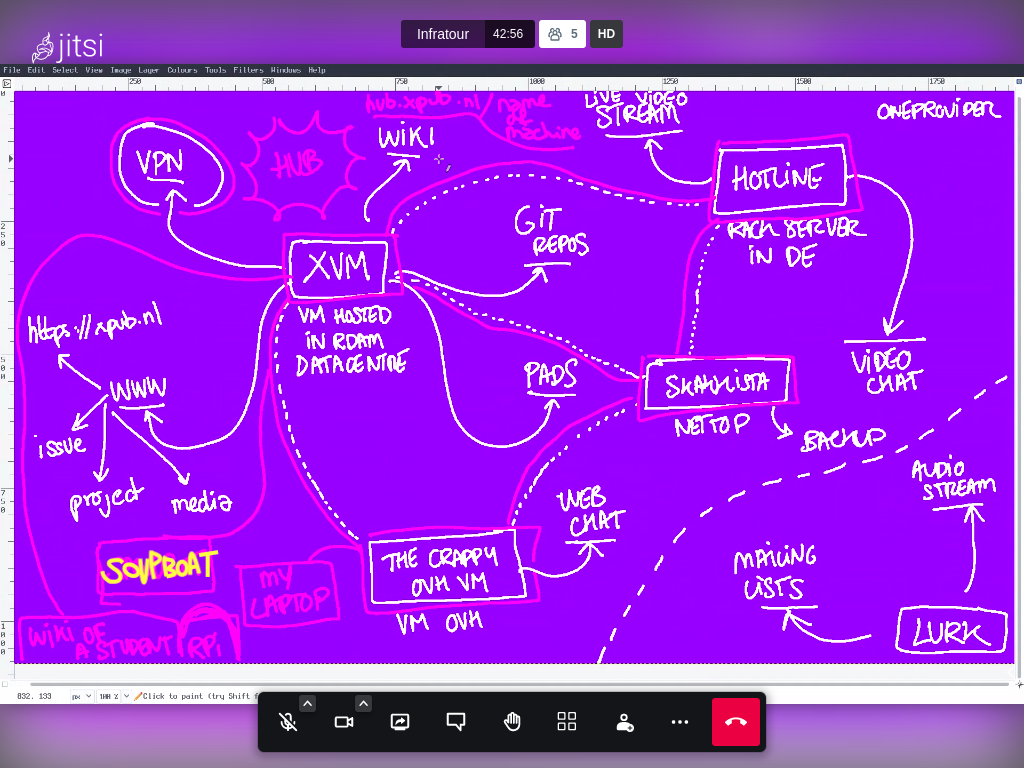XPUB Infrastructour
XPUB Infrastructour 2022
<media-tag src="https://files.cryptpad.fr/blob/42/4262503529c2f1a1e7dd5111a8a436fd5895cab02f47e2cf" data-crypto-key="cryptpad:bsysw1KW1R12eeUr9umYppBB1Cz1kWEodA/ky8QeJsc="></media-tag>
A short history of XPUB
- 2002: MDMA
- 2007: Networked Media
- 2012: Media Design (take II)
- 2016: XPUB
A short history of XPUB
- 2002: MDMA
- Femke Snelting & Matthew Fuller
- 2007: Networked Media
- Florian Cramer
- 2012: Media Design (take II)
- Renee Turner & Simon Pummell
- 2016: XPUB
- Aymeric Mansoux
Institutional networks
hierarchical
adjacent
Infrastructure
Information infrastructure is a tricky thing to analyze. Good, usable systems disappear almost by definition. The easier they are to use, the harder they are to see. As well, most of the time, the bigger they are, the harder they are to see. Unless we are electricians or building inspectors, we rarely think about the myriad of databases, standards, and instruction manuals subtending our reading lamps, much less about the politics of the electric grid that they tap into. And so on, as many layers of technology accrue and expand over space and time. Systems of classification (and of standardization) form a juncture of social organization, moral order, and layers of technical integration. Each subsystem inherits, increasingly as it scales up, the inertia of the installed base of systems that have come before.
Source: Bowker & Star: https://hub.xpub.nl/bootleglibrary/read/58/pdf#page=46
<a href="https://test.roelof.info/infrastructours.html"> <media-tag src="https://files.cryptpad.fr/blob/90/9090b409205a8f583f30eca74a2fc5e909a20e251847273e" data-crypto-key="cryptpad:3VZqpZmOgMVBj63he9/gvwqlHXseSfY2qdS+QR2Lyb8="></media-tag> </a>
Infrastructour
Roel Roscam Abbing imagined this term to describe a an event to visit data centers with Touring busses. Large data centers, such as those of Google and Amazon, are often housed in remote non-descript locations typically adjacent to water sources. Data centers are often contested: they consume enormous amounts of energy and impact/pollute their environment, primarily through the heat that they produce and their constant need for cooling, often using local water resources. At the same time they operate with local and national politics via the allure of promised (indirect) employment and economic benefits.
Screen walk Aymeric Mansoux & Roel Roscam-Abbing https://thephotographersgallery.org.uk/whats-on/watch-screen-walk-aymeric-mansoux-and-roel-roscam-abbing
Rhetorical spaces … are fictive but not fanciful or fixed locations, whose (tacit, rarely spoken) territorial imperatives structure and limit the kinds of utterances that can be voiced within them with a reasonable expectation of uptake and “choral support”: an expectation of being heard, understood, taken seriously. They are the sites where the very possibility of an utterance counting as “true-or-false” or of a discussion yielding insight is made manifest. Some simple examples will indicate what I mean the term to achieve. . . . Imagine trying to make a true statement about whether it is more convenient to fly into Newark or La Guardia airport in the year 1600. The statement would not be false but meaningless: it could neither be true nor false within the available discursive possibilities. Or imagine trying to have a productive public debate about abortion in the Vatican in 1995, where there is no available rhetorical space, not because the actual speech acts involved would be overtly prohibited, but because the available rhetorical space is not one where ideas on such a topic can be heard and debated openly, responsively. . . .what I want this terminology [rhetorical space] to do [is], namely to deflect the focus of philosophical analysis away from single and presumably self-contained propositional utterances pronounced by no one in particular and as though into a neutral space; and to move it into textured locations where it matters who is speaking and where and why, and where such mattering bears directly upon the possibility of knowledge claims, moral pronouncements, descriptions of “reality” achieving acknowledgement, going through. Often in such spaces discourse becomes a poiesis, a way of representing experience, reality, that re-makes and alters it in the process. And the making is ordinarily a communal process, dependent for its continuance on receptive conditions, on engaged responses both favourable and critical. (p. x)
Infrastructure produces relationships… but which ones? What questions are raised? (Rhetorical spaces … Lorraine Code via Hope Olson…)
https://hub.xpub.nl/bootleglibrary/read/97/pdf#page=11
<media-tag src="https://files.cryptpad.fr/blob/52/5236de153fa78ffad16f93a6ffe3b565942ab10c84a9becc" data-crypto-key="cryptpad:X3IkkBDjaaDVA20rcNdukJ1z4uYdu9yJXR8iN4j0530="></media-tag>
XPUB
<media-tag src="https://files.cryptpad.fr/blob/83/836ef59fc63540124c3cd6431f49bf1a248ac15feb46a950" data-crypto-key="cryptpad:LoyFsSXxArMuFcbUiqIzB3Rk1hKb8ClUGtre86qdHHI="></media-tag>
Source: 
Mailing list
- xpub@we.lurk.org
- md@we.lurk.org
NB: When sending a mail to the list, you must use the same email address as you use to receive messages. Otherwise it will be considered “outside” and require a list moderator to approve it.
Wiki history
https://pzwiki.wdka.nl/mw-mediadesign/index.php?title=Main_Page&dir=prev&action=history
- Examples: Random Page, History
Wiki: Special Issues
A Category of Categories…
https://pzwiki.wdka.nl/mediadesign/Category:Special_Issue
Wiki: User pages – BAD EXAMPLE
https://pzwiki.wdka.nl/mediadesign/READING_AND_WRITING
How to Move a page from Main to a User page…
Use Move,
Select “User” from the dropdown and add your user name followed by a slash in front of the original page name. DONE. The old page now redirects to your user page so no links/bookmarks are broken, and the new page has a link to your wiki user page.
Zulip
<media-tag src="https://files.cryptpad.fr/blob/4f/4f333b5653460f8b1b6579957a5825ec00836d0e4a4d7fa8" data-crypto-key="cryptpad:GfbEBS14KvtQFfq1mjduUWedwcySO8tyoOLuKY4i7X8="></media-tag>
Zulip is an open source chat and collaborative software created by Jeff Arnold, Waseem Daher, Jessica McKellar, and Tim Abbott in 2012. Today, it is one of the free and open source alternatives to Slack, with over 40,000 commits contributed by 660 people.
https://en.wikipedia.org/wiki/Zulip
Jitsi
<media-tag src="https://files.cryptpad.fr/blob/bc/bc50f338bb64c3afdaae1767b93707c1981047a1f3a5c686" data-crypto-key="cryptpad:yTv7t/qrz1vUw5ywIsysobMQHUPO7MU2na8PcyZsFk4="></media-tag>
git.xpub.nl
sandbox(es) + jupyter notebooks
- Example of an etherpad running on sandbot …
- soupboat
- bootleglibrary
- warnet Natasha Berting
- https://pzwiki.wdka.nl/mediadesign/User:Tash
- https://project.xpub.nl/instant-warnet/
- https://project.xpub.nl/instant-warnet/pdf/Berting-Making-Silences-On-Social-Media.pdf
